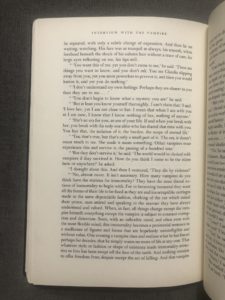One of my pseudo-quarantine entertainments has been to read or reread most of the vampire stories I have on hand. So far, this has included I Am Legend, Interview with the Vampire, and Let the Right One In, with Dracula waiting in the wings. Along with providing an effective symbolic or allegorical nemesis, the vampire story seems particularly well suited to tell a story with extended historical sweep. To my surprise, when I went looking for examples of vampire stories that take this approach, Interview with the Vampire (along with Rice’s other work in this fictional continuity) was the only obvious example, though Interview goes all in, with a narrative that spans several hundred years and themes of change and adaptation.
I brought this up elsewhere, and someone mentioned the “Anno Dracula” collection of novels by Kim Newman, which is set in an alternative history where the events depicted in Stoker’s Dracula occur, but imagines what might happen were Dracula victorious. Though this series does include entries that occur in various historical time periods, the stories themselves seem to be more like a collection of separate historical vignettes (based on a quick wikipedia dive). For example, it looks like there is a Jack the Ripper story and a modern Japanese schoolgirl story. I have heard some of these works are enjoyable, so this is not meant as a criticism, but they seem to have a focus different from what I describe above.
There are several tabletop games that use vampires as protagonists which feature the longue durée as a core design element, none of which I have played. (I have played Vampire: The Masquerade, a long time ago, but that is very much histoire événementielle if it has any particular temporal disposition.) There is Undying, by Paul Riddle, which applies the Apocalypse World design formula to vampires. I read this a while back but have yet to see it in play. This is how the game describes itself:
Game play revolves around brief periods of intense conflict, where old rivalries and new slights spark an inferno, and long stretches of intrigue, where intricate plots are set in motion. … Then, the long years unfold and selfish aims ferment. Plotting and scheming over long periods of relative calm are summarized so that the narrative focuses on decisive events across the gulf of time.
Undying, p. 12 (2016)
There is also Thousand Year Old Vampire, which I have not read or played. This is a single-player journaling game, however, and I am mostly uninterested in solo tabletop play.
Though I am moderately-read in this area, I am hardly a connoisseur. It is likely I am missing some good examples of vampire stories that make use of historical narrative sweep. Does anyone have any recommendations for other hidden gems? In terms of style, I am more interested in works with kinship to the novels I mention above and less interested in urban fantasy or supernatural drama. So, more like Let the Right One In or Only Lovers Left Alive and less like True Blood or The Vampire Diaries.


The Historian by Elizabeth Kostova is a great vampire detective thriller read. Lots of lore about Dracula woven across a few different timelines in the 20th century.
I ran a gurps campaign about vampires that stretched over centuries (with a prologue session set in the chalcolithic) that’s on indefinite hiatus. I do plan to resurrect it at some point. I wrote about it at the time:
https://diceandlives.wordpress.com/tag/sleepless-nights/page/2/
I tried to find books with the same kind of historical scope, but came up empty.
I really enjoyed Octavia Butler’s vampire novels but I don’t think they fit the theme you’re looking for. Have had “Thousand Year Vampire” sitting here on my desk for a few weeks now. Never played a solo game like that before, but I was just too intrigued by the design/concept to not buy it and (hopefully) give it a try one of these days.
‘Byzantium’ the film with Gemma Arterton has a *little bit* of this.
@pjamesstuart
I hadn’t heard about Byzantium before and it looks promising even if it ends up being not exactly an example of the dynamic discussed above. Thanks for the suggestion.
this is not close to anything you are searching, but i could not resist. If you dont speak spanish, just ignore it hehe
George R.R. Martin’s Fevre Dream is good for this. It’s set up and down the Mississippi both before and after the American Civil War, and it features two vampiric characters with radically different philosophies of history and vampirism, using them to reflect on the politics of the era.
@Jon
Thanks for the pointer. Added to my list.